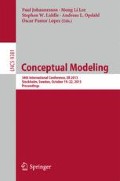Abstract
Expert Finding (EF) techniques help in discovering people having relevant knowledge and skills. But for their validation, EF techniques usually rely on experts, meaning using another EF technique, generally not properly validated, and exploit them mainly for output validations, meaning only at late stages. We propose a model, which builds on literature in Psychology and practice, to identify generic concepts and relations in order to support the analysis and design of EF techniques, thus inferring potential improvements during early stages in an expert-free manner. Our contribution lies in the identification and review of relevant literature, building the conceptual model, and illustrating its use through an analysis of existing EF techniques. Although the model can be improved, we can already identify strengths and limitations in recent EF techniques, thus supporting the usefulness of a model-based analysis and design for EF techniques.
Access this chapter
Tax calculation will be finalised at checkout
Purchases are for personal use only
Notes
References
Chi, M.T.H.: Two approaches to the study of experts’ characteristics. In: Ericsson, K.A., Charness, N., Feltovich, P.J., Hoffman, R.R. (eds.) The Cambridge Handbook of Expertise and Expert Performance, pp. 21–30. Cambridge University Press, New York (2006)
Ericsson, K.A.: The influence of experience and deliberate practice on the development of superior expert performance. In: Ericsson, K.A., Charness, N., Feltovich, P.J., Hoffman, R.R. (eds.) The Cambridge Handbook of Expertise and Expert Performance, pp. 683–703. Cambridge University Press, New York (2006)
Ericsson, K.A.: An Introduction to cambridge handbook of expertise and expert performance: its development, organization, and content. In: Ericsson, K.A., Charness, N., Feltovich, P.J., Hoffman, R.R. (eds.) The Cambridge Handbook of Expertise and Expert Performance. Cambridge University Press, New York (2006)
Ericsson, K.A.: Creative expertise as superior reproducible performance: innovative and flexible aspects of expert performance. Psychol. Inquiry 10(4), 329–333 (1999)
Ericsson, K.A., Krampe, R.T., Tesch-romer, C.: The role of deliberate practice in the acquisition of expert performance. Psychol. Rev. 100(3), 363–406 (1993)
Fazel-Zarandi, M., Fox, M.S., Yu, E.: Ontologies in expertise finding systems: modeling, analysis, and design. In: Ahmad, M.N., Colomb, R.M., Abdullah, M.S. (eds.) Ontology-Based Applications for Enterprise Systems and Knowledge Management, pp. 158–177. IGI Global, Hershey (2013)
Karimzadehgan, M., White, R.W., Richardson, M.: Enhancing expert finding using organizational hierarchies. In: Boughanem, M., Berrut, C., Mothe, J., Soule-Dupuy, C. (eds.) ECIR 2009. LNCS, vol. 5478. Springer, Heidelberg (2009)
Maybury, M.T.: Expert Finding Systems. MITRE Center for Integrated Intelligence Systems, Bedford (2006)
McDonald, D.W., Ackerman, M.S.: Just talk to me: a field study of expertise location. In: Proceedings of the Conference on CSCW, pp. 315–324. ACM, New York (1998)
Mockus, A., Herbsleb, J.D.: Expertise browser: a quantitative approach to identifying expertise. In: Proceedings of the 24th ICSE, pp. 503–512. ACM, New York (2002)
Mohebzada, J., Ruhe, G., Eberlein, A.: Systematic mapping of recommendation systems for requirements engineering. In: 2012 ICSSP, pp. 200–209 (2012)
Serdyukov, P., Hiemstra, D.: Modeling documents as mixtures of persons for expert finding. In: Macdonald, C., Ounis, I., Plachouras, V., Ruthven, I., White, R.W. (eds.) ECIR 2008. LNCS, vol. 4956, pp. 309–320. Springer, Heidelberg (2008)
Sonnentag, S., Niessen, C., Volmer, J.: Expertise in software design. In: Ericsson, K.A., Charness, N., Feltovich, P.J., Hoffman, R.R. (eds.) The Cambridge Handbook of Expertise and Expert Performance. Cambridge University Press, New York (2006)
Tang, J., Zhang, D., Yao, L.: Social network extraction of academic researchers. In: 7th IEEE ICDM, pp. 292–301 (2007)
Vergne, M., Susi, A.: Expert finding using Markov networks in open source communities. In: Jarke, M., Mylopoulos, J., Quix, C., Rolland, C., Manolopoulos, Y., Mouratidis, H., Horkoff, J. (eds.) CAiSE 2014. LNCS, vol. 8484, pp. 196–210. Springer, Heidelberg (2014)
Yimam-Seid, D., Kobsa, A.: Expert-finding systems for organizations: problem and domain analysis and the DEMOIR approach. J. Organ. Comput. Electron. Commer. 13(1), 1–24 (2003)
Zhang, J., Ackerman, M.S., Adamic, L.: Expertise networks in online communities: structure and algorithms. In: Proceedings of the 16th International Conference on WWW, pp. 221–230. ACM, New York (2007)
Author information
Authors and Affiliations
Corresponding author
Editor information
Editors and Affiliations
Rights and permissions
Copyright information
© 2015 Springer International Publishing Switzerland
About this paper
Cite this paper
Vergne, M., Susi, A. (2015). Breaking the Recursivity: Towards a Model to Analyse Expert Finders. In: Johannesson, P., Lee, M., Liddle, S., Opdahl, A., Pastor López, Ó. (eds) Conceptual Modeling. ER 2015. Lecture Notes in Computer Science(), vol 9381. Springer, Cham. https://doi.org/10.1007/978-3-319-25264-3_40
Download citation
DOI: https://doi.org/10.1007/978-3-319-25264-3_40
Published:
Publisher Name: Springer, Cham
Print ISBN: 978-3-319-25263-6
Online ISBN: 978-3-319-25264-3
eBook Packages: Computer ScienceComputer Science (R0)

